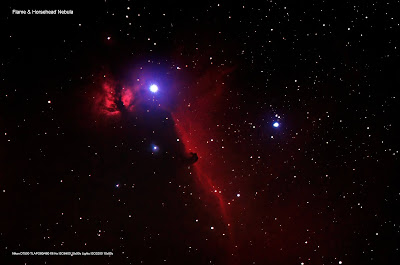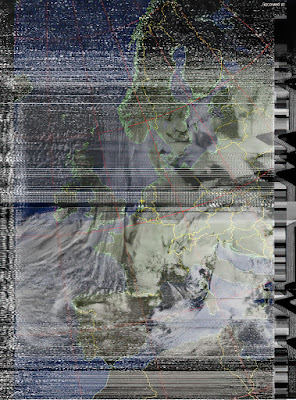Pascal Hilkens Astro Home Page
Wednesday, December 9, 2020
NOAA18 091220 UT10h14
NOAA18 weather image of this morning UT10h14. Picture was received via WebSDR @Nurnberg (Germany). Pictures are stacked and editing using CS4 and DeNoise AI.
Monday, December 7, 2020
M33 Triangulum Galaxy
The Triangulum Galaxy or Messier M33 (NGC589) is located in constellation Triangulum and about 2.73 million ly away from Earth. It's the third largest galaxy of the Local Group, next to our own Milky Way and the Andromeda Galaxy M31. Some people are able to see M33 with the naked eye making this object the most distant object seen without ny optical support.
Setting : Nikon D7500 and TLAPO80/480 f/6; ISO3200 72x60s and 5x darks. Camera control with DigiCamControl. Stacking using APP and final editing in CS4 and DeNoise AI.
Flame & Horsehead Nebula reworked
On the evening of december 5th, I made some pictures of the flame nebula (NGC2024) and horsehead nebula (IC434). For the first time I used my new H-alpha filter 13nm narrowband. It was difficult to get the stars in focus but next time I will spend more time to get this fixed.
Conditions : at start high humidity, later freezing -2.5°C and high clouds. So conditions were poor but still I'm proud of the final resuls. My best ever flame and horsehead nebula.
Setting : Nikon D7500 and TLAPO 80/480 f/6; H-alpha ISO6400 19x90s; lights ISO3200 10x60. Cameracontrol with DigiCamControl; stacking using DeepSkyStacker (seperate Ha and lights) and final stacking of the two results with CS4. DeNoise AI was used to remove the noise from the picture.
Sunday, December 6, 2020
Horsehead and Flame Nebula
Yesterday evening I made some pictures of the flame nebula (NGC2024) and horsehead nebula (IC434). For the first time I used my new H-alpha filter 13nm narrowband. It was difficult to get the stars in focus but next time I will spend more time to get this fixed.
Conditions : at start high humidity, later freezing -2.5°C and high clouds. So conditions were poor but still I'm proud of the final resuls. My best ever flame and horsehead nebula.
Setting : Nikon D7500 and TLAPO 80/480 f/6; H-alpha ISO6400 19x90s; lights ISO3200 10x60. Cameracontrol with DigiCamControl; stacking using APP and final editing with CS4.
Saturday, December 5, 2020
Wednesday, December 2, 2020
INTER-MAI-75 ARISS-SSTV - First Download
My first ever download of images from the International Space Station ISS. The event was organised by ARISS and MAI Moskovskiy Aviatsionniy Institoet (Moscow Aviation Institute) on december 1 and 2, 2020. Due to some issues no signal was made on december 1, so all focus for today, and with succes.
Today, the signal was available from UT11h50-18h25 and anytime the ISS signals could be picked up by an antenna. I used the antenna's connected through WebSDR in the UK, Russia, Belgium and the Netherlands. The signals were send in FM 145800kHz. Decoding was done with MMSSTV software. In order to know when to connect with the WebSDR stations, Heavens-Above was used to locate the position of the ISS.
Results : in total I could connect 3 times with the ISS and it was possible to make contact through each of the 4 WebSDR stations. Unfortunately I was not able to download any perfect image. I saw this before when connecting with the NOAA satellites via WebSDR. The best result was made with the station @Heppen which is very close to my homeadress. It could be that due to the short distance of this station to my homelocation, dataloss is minimal. It's amazing that I could connect with the ISS and downloading TV-signals and getting images. The ISS did send 12 images, I could download 4 of them. Interesting was aswell that during my last download I could see ISS live passing above my house :) really cool!
Today, the signal was available from UT11h50-18h25 and anytime the ISS signals could be picked up by an antenna. I used the antenna's connected through WebSDR in the UK, Russia, Belgium and the Netherlands. The signals were send in FM 145800kHz. Decoding was done with MMSSTV software. In order to know when to connect with the WebSDR stations, Heavens-Above was used to locate the position of the ISS.
Results : in total I could connect 3 times with the ISS and it was possible to make contact through each of the 4 WebSDR stations. Unfortunately I was not able to download any perfect image. I saw this before when connecting with the NOAA satellites via WebSDR. The best result was made with the station @Heppen which is very close to my homeadress. It could be that due to the short distance of this station to my homelocation, dataloss is minimal. It's amazing that I could connect with the ISS and downloading TV-signals and getting images. The ISS did send 12 images, I could download 4 of them. Interesting was aswell that during my last download I could see ISS live passing above my house :) really cool!
ARISS
Amateur Radio on the International Space Station (ARISS) inspires people and students, worldwide, to pursue interests and careers in science, technology, engineering and math through amateur radio communications opportunities with the International Space Station (ISS) on-orbit crew.
Amateur Radio on the International Space Station (ARISS) inspires people and students, worldwide, to pursue interests and careers in science, technology, engineering and math through amateur radio communications opportunities with the International Space Station (ISS) on-orbit crew.
All software and websites used to make the connection possible are available via my blog : see this link.
NOAA 18 UT9h56 Weather Image
Weather picture from NOAA 18 UT9h56 using Websdr Noordwijk (NL). Recording with WXtoIMG and decoding with APTDecoder. Decoding is still needed as allignment keeps failing. Editing using CS4 and DeNoise AI.
Subscribe to:
Comments (Atom)








